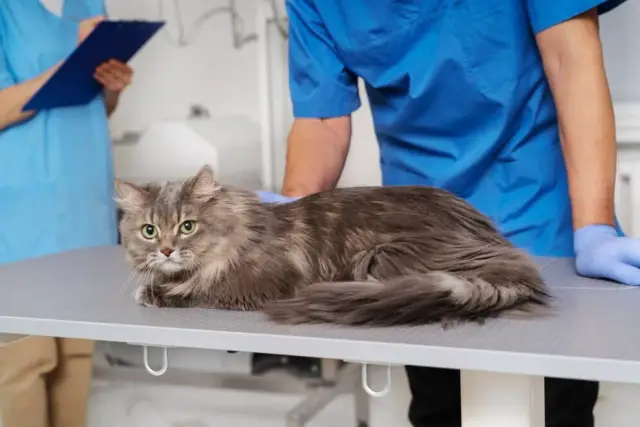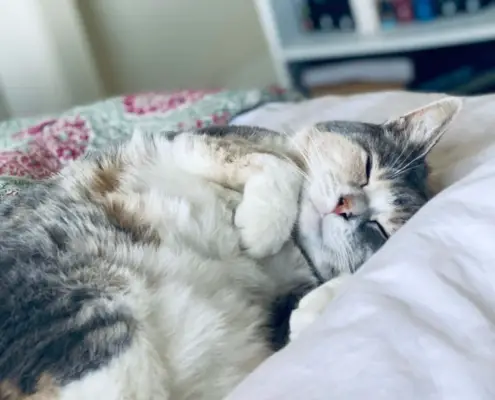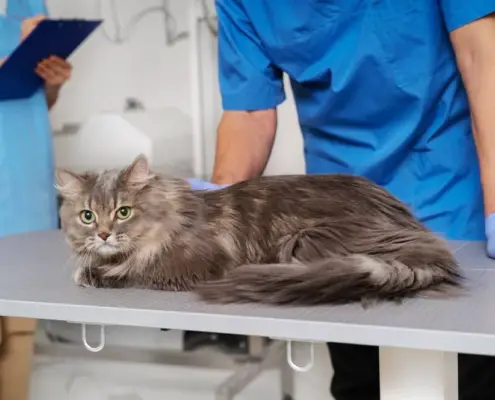
Neurological issues in cats can be a concerning and challenging experience for both pet owners and their feline companions. These issues affect the nervous system, which can lead to a variety of symptoms and behaviors that may be confusing or distressing. Understanding these neurological issues is crucial in order to provide the best care and support for your cat.
Neurological issues in cats can manifest in various ways, including seizures, tremors, loss of balance, weakness, and changes in behavior. These symptoms may be intermittent or constant, and their severity can vary from mild to severe. It is important to note that not all symptoms may be immediately apparent, and it may take careful observation to identify neurological issues in your cat.
There are several potential causes of neurological issues in cats. In some cases, they may be congenital, meaning they are present from birth. Other times, they may be acquired due to trauma, infections, or underlying medical conditions such as brain tumors or metabolic disorders. Identifying the underlying cause of your cat’s neurological issues is essential for effective treatment and management.
Common symptoms of neurological issues in cats
Recognizing the common symptoms of neurological issues in cats is crucial for early detection and intervention. Cats with neurological issues may experience seizures, which can vary in intensity and duration. These seizures may manifest as twitching, convulsions, or loss of consciousness.
Loss of balance and coordination is another common symptom of neurological issues. Cats may have difficulty walking or may exhibit a wobbly gait. They may also struggle with jumping or climbing, and may often fall or stumble.
Changes in behavior can also be indicative of neurological issues in cats. They may display signs of confusion, disorientation, or altered sleep patterns. Aggression, excessive vocalization, or withdrawal may also be observed.
Causes of neurological issues in cats
Neurological issues in cats can be caused by a variety of factors. Some cats may be born with congenital neurological disorders, which are present from birth. These disorders can be genetic or result from developmental abnormalities.
Acquired neurological issues can be caused by trauma, such as head injuries from accidents or falls. Infections, such as feline leukemia virus or toxoplasmosis, can also affect the nervous system. Additionally, certain medical conditions like brain tumors, epilepsy, or metabolic disorders can lead to neurological symptoms in cats.
It is important to consult with a veterinarian to determine the underlying cause of your cat’s neurological issues. They will be able to conduct various tests and examinations to reach an accurate diagnosis.
Diagnosing neurological issues in cats
Diagnosing neurological issues in cats can be complex and may require a combination of physical examinations, diagnostic tests, and imaging techniques. The veterinarian will begin by conducting a thorough physical examination, observing your cat’s behavior and neurological responses.
Blood tests may be performed to rule out any underlying medical conditions that could be causing the neurological symptoms. Imaging techniques, such as X-rays, MRI scans, or CT scans, may be used to visualize the structure of the brain and identify any abnormalities.
In some cases, a cerebrospinal fluid analysis may be necessary to evaluate the fluid surrounding the brain and spinal cord. This analysis can provide valuable information about potential infections or inflammation.
Once a diagnosis has been made, the veterinarian will work with you to develop an appropriate treatment plan for your cat’s specific condition.
Treatment options for neurological issues in cats
The treatment options for cats with neurological issues will depend on the underlying cause and severity of the condition. In some cases, medication may be prescribed to manage symptoms and improve your cat’s quality of life.
Anti-seizure medications, such as phenobarbital or levetiracetam, may be used to control seizures in cats with epilepsy or other seizure disorders. These medications can help reduce the frequency and intensity of seizures, allowing your cat to lead a more comfortable life.
In cases where an infection is causing the neurological symptoms, antibiotics or antiviral medications may be prescribed. These medications are targeted at eliminating the underlying infection and reducing its impact on the nervous system.
In more severe cases, surgery may be necessary to remove brain tumors or correct other structural abnormalities. This option will be considered if it is deemed safe and beneficial for your cat’s overall well-being.
It is important to note that treatment for neurological issues in cats may not always lead to a complete cure. However, with appropriate management and care, many cats can experience significant improvements in their symptoms and quality of life.
Medications and therapies for managing neurological issues in cats
In addition to prescribed medications, there are other therapeutic approaches that can help manage neurological issues in cats. Physical therapy and rehabilitation can be beneficial in improving muscle strength, coordination, and balance.
Environmental enrichment is also essential for cats with neurological issues. Providing a stimulating and comfortable environment can help reduce stress and promote mental well-being. This can include providing interactive toys, scratching posts, and comfortable resting areas.
Alternative therapies, such as acupuncture or chiropractic care, may also be explored as complementary treatments for cats with neurological issues. These therapies can help alleviate pain and improve overall mobility.
It is important to consult with a veterinarian or a veterinary specialist experienced in neurological disorders to determine the most appropriate medications and therapies for your cat’s specific condition.
Tips for caring for a cat with neurological issues at home
Caring for a cat with neurological issues can be demanding, but there are several tips that can help you provide the best care and support at home.
- Establish a routine: Cats with neurological issues thrive on consistency and routine. Establish a regular feeding schedule, playtime, and sleep routine to help them feel secure and reduce anxiety.
- Provide a safe and accessible environment: Create a cat-friendly environment by removing hazards and providing easy access to litter boxes, food, and water. Consider installing ramps or steps to help your cat navigate elevated surfaces.
- Monitor and record symptoms: Keep a record of your cat’s symptoms, behaviors, and any changes you observe. This information will be valuable for your veterinarian in monitoring the progression of the condition and adjusting the treatment plan if necessary.
- Seek support and guidance: Join online support groups or forums where you can connect with other cat owners who have experience with neurological issues. They can provide valuable advice, support, and empathy.
- Be patient and understanding: Cats with neurological issues may exhibit behaviors that are challenging or frustrating. Remember to be patient and understanding, providing them with the care and love they need.
Creating a safe environment for a cat with neurological issues
Here are some steps you can take to ensure their safety and well-being:
- Remove hazards: Identify and remove any potential hazards that could cause harm to your cat. This includes sharp objects, toxic plants, open windows or balconies, and electrical cords.
- Secure the home: Use baby gates or barriers to restrict access to areas of the house that may pose a risk to your cat. This can include stairs, balconies, or rooms with fragile items.
- Provide easy access to essential resources: Ensure that your cat has easy access to litter boxes, food, and water. Consider placing multiple litter boxes throughout the house to accommodate their needs.
- Use non-slip surfaces: Cats with neurological issues may have difficulty maintaining their balance. Use non-slip surfaces, such as rugs or mats, to provide them with better traction and stability.
- Consider adaptive equipment: In some cases, adaptive equipment such as harnesses, slings, or wheelchairs may be beneficial for cats with severe mobility issues.
Consult with your veterinarian or a veterinary specialist to determine if these options are suitable for your cat.
Support resources for cat owners dealing with neurological issues
Dealing with neurological issues in cats can be emotionally challenging. Fortunately, there are resources available to provide guidance and support.
- Veterinary specialists: Seek out veterinary specialists who have expertise in neurology. They can provide advanced diagnostics, treatment options, and ongoing support for your cat’s condition.
- Support groups: Join online support groups or forums where you can connect with other pet owners facing similar challenges. Sharing experiences and advice can be invaluable in navigating the complexities of neurological issues in cats.
- Educational resources: Stay informed by reading reputable books, articles, and websites that provide information on neurological issues in cats. This knowledge will empower you to make informed decisions regarding your cat’s care.
- Pet insurance: Consider obtaining pet insurance that covers neurological conditions. This can help alleviate the financial burden associated with ongoing treatment and management.
Remember, you are not alone in caring for your cat with neurological issues. Reach out for support and guidance when needed, and always prioritize your cat’s well-being and comfort.
Providing the best care for cats with neurological issues
Caring for cats with neurological issues requires patience, understanding, and a commitment to their well-being. By understanding the common symptoms, causes, and treatment options, you can provide the best care and support for your feline companion.
Consulting with a veterinarian is essential in diagnosing and managing your cat’s neurological issues. They will guide you in developing a comprehensive treatment plan tailored to your cat’s specific needs.
Creating a safe and enriching environment at home will help your cat thrive despite their neurological challenges. Monitoring their symptoms, seeking support, and being patient and understanding are key components of providing the best care for your cat.
Remember, each cat is unique, and their journey with neurological issues will be individual. With the right resources, support, and love, you can ensure that your cat leads a happy and fulfilling life, even with their neurological challenges.
If your cat is displaying symptoms of neurological issues, consult with a veterinarian experienced in neurology for a comprehensive evaluation and personalized treatment plan.
If you enjoyed my article, I would appreciate you sharing it with your network.

Sima Ndlebe
Sima writes for CatBuzz. He is interested in Cats, Health and Fitness, and Entrepreneurship.
Published: 11 October 2023
Related Articles
Disclaimer
The content found on CatBuzz.org is presented on an "as is" basis and is intended for general consumer information and education purposes only. Any utilization of this information is voluntary and solely at the user's own risk.
None of the articles or content should be regarded as, or used in place of, veterinary medical advice, diagnosis, or treatment. The information provided on the website is purely for educational and informational intentions and should not be considered a substitute for professional guidance from a veterinarian or other qualified expert. The articles are designed to inform consumers about veterinary healthcare and medical matters that may impact their cat's daily life. It should be noted that this website and its services do not constitute the practice of any form of veterinary medical advice, diagnosis, or treatment. CatBuzz.org explicitly disclaims any liability for any direct or indirect damages or losses that may arise from the use of or reliance on the information contained within the content.
Consumers must consult a veterinarian, veterinary specialist, or another qualified veterinary healthcare provider when seeking advice regarding their cat's health or medical conditions. It is important not to ignore, avoid, or postpone seeking medical advice from a veterinarian or other qualified veterinary healthcare provider solely based on information obtained from this website. If you believe that your cat may be experiencing a medical issue or condition, it is imperative to promptly contact a qualified veterinary healthcare professional.



